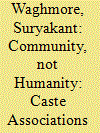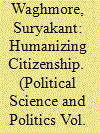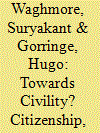|
|
|
Sort Order |
|
|
|
Items / Page
|
|
|
|
|
|
|
| Srl | Item |
| 1 |
ID:
165939


|
|
|
|
|
| Summary/Abstract |
This paper explores the nature of urbanism that caste associations seek to construct in the metropolis of Mumbai. To this end it asks: what role do caste associations play in the cosmopolitanism(s) of Mumbai? How do they help individuals negotiate cosmopolitan urbanism? What is the nature of the civility and public-ness they aspire to and work towards? What are the challenges they face? I suggest that caste associations of the ‘pure’ and ‘privileged’ work towards achieving an ideal of Hindu cosmopolitanism. Such associations may seem to be ‘bad’ cases of cosmopolitanism because they achieve a certain kind of limited openness and tolerance while continuing caste closure. However, they attempt to provide cultural roots to consumerist individuals in the urban environment. The challenges facing caste associations point both to the limits of urban Hindu cosmopolitanism as an ideal and social practice and to the lack of alterity as a necessary moral value for Hindu cosmopolitanism.
|
|
|
|
|
|
|
|
|
|
|
|
|
|
|
|
| 2 |
ID:
181073


|
|
|
|
|
| Summary/Abstract |
In December 2019, Ramchandra Guha, a renowned liberal historian in India, was briefly detained in Bangalore for protesting against the Citizenship Amendment Act (CAA). When he was arrested, Guha was holding a placard with an image of Bhimrao Ramji Ambedkar, the architect of India’s constitution, and a message that read, “CAA against Constitution.” A few weeks later, Chandrashekar Azad, a prominent BahujanFootnote 1 activist who took to the streets against the CAA, was arrested and jailed for several months. Azad had carried a copy of the Constitution of India with an image of Ambedkar at all of his rallies and protests against the CAA, claiming that the current government led by the Bharatiya Janata Party (BJP) wants to demolish samata (equality) and samajik nyay (social justice)—both promised in the country’s founding document.
|
|
|
|
|
|
|
|
|
|
|
|
|
|
|
|
| 3 |
ID:
165934


|
|
|
|
|
| Summary/Abstract |
Civility is generally lost in translation in non-Western contexts, and tends to be limited to its liberal form in the social sciences. To address this impasse of West versus East, individual versus community, and political versus civil society, we seek to recover the idea of civility. In this special section, we understand civility as socio-cultural processes and politics that challenge the lack of publicness and commitment to public life, equality and justice in society. We suggest that civility provides insights into the social life of democracy and the lived challenges to social democracy. The essays in this special section critically explore and engage with the paradox of high democracy and low civility that plagues India, where democratic consolidation translates into limited justice and minimal equality, along with increased exclusion and performative violence against marginal groups. The papers in this special section offer fine-grained and detailed analyses of social interactions across India. In doing so, they make a strong case for shifting from analyses of formal democracy and civil society toward the question of civility. Such a move enables us to explore justice, equality and emancipation as social processes, struggles and experiences rather than as preconditions for democratic societies.
|
|
|
|
|
|
|
|
|
|
|
|
|
|
|
|
|
|
|
|
|